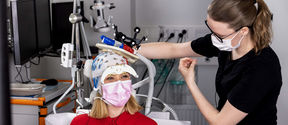Algorithm marks the spot: making brain stimulation more reliable
Method uses brain activity feedback to automate widely used manual technique

The American Institute for Medical and Biological Engineering (AIMBE) has announced the election of Professor Risto Ilmoniemi to its College of Fellows. Ilmoniemi was nominated, reviewed, and elected by peers and members of the AIMBE College of Fellows for innovative contributions to transcranial magnetic stimulation and electromagnetic brain imaging technology, and to brain signal analysis.
The College of Fellows is comprised of the top two percent of medical and biological engineers in the country. The most accomplished and distinguished engineering and medical school chairs, research directors, professors, innovators, and successful entrepreneurs comprise the College of Fellows.
AIMBE Fellows are regularly recognized for their contributions in teaching, research, and innovation. AIMBE Fellows have been awarded the Nobel Prize, the Presidential Medal of Science and the Presidential Medal of Technology and Innovation, and many also are members of the National Academy of Engineering, National Academy of Medicine, and the National Academy of Sciences.
A formal induction ceremony will be held during AIMBE’s 2022 Annual Event on March 25. Ilmoniemi will be inducted along with 152 colleagues who make up the AIMBE Fellow Class of 2022. For more information about the AIMBE Annual Event, please visit www.aimbe.org.
AIMBE’s mission is to recognize excellence in, and advocate for, the fields of medical and biological engineering to advance society. Since 1991, AIMBE’s College of Fellows has led the way for technological growth and advancement in the fields of medical and biological engineering. AIMBE Fellows have helped revolutionize medicine and related fields to enhance and extend the lives of people all over the world. They have successfully advocated for public policies that have enabled researchers and business-makers to further the interests of engineers, teachers, scientists, clinical practitioners, and ultimately, patients. AIMBE Fellows are committed to giving back to the fields of medical and biological engineering through advocacy efforts and public policy initiatives that benefit the scientific community, as well as society at large.
See 2022 AIMBE Fellows and the original media release
Read more about Risto Ilmoniemi's research and career:

Method uses brain activity feedback to automate widely used manual technique

An Aalto-led team is developing new transcranial magnetic stimulation (TMS) technology to treat pain, depression and other neurological conditions. The aim is faster and more effective treatment.



